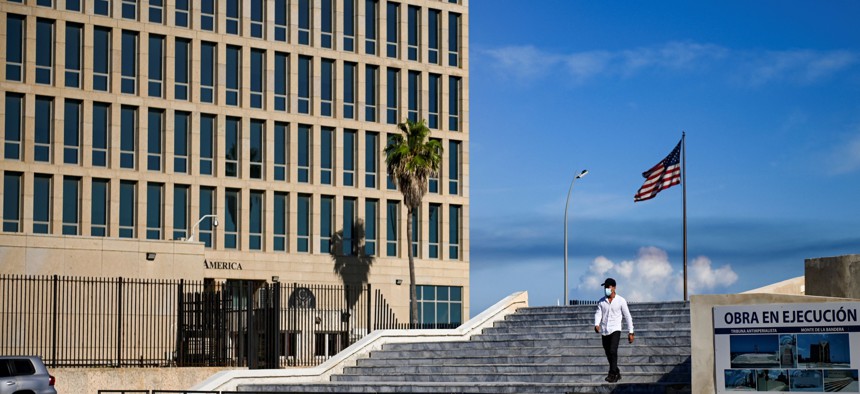
The Justice Department has issued a new interim rule designating how to compensate employees and dependents affected by anomalous health incidents, more commonly known as Havana syndrome for brain injuries first experienced by State Department personnel in Havana, Cuba, in 2016. YAMIL LAGE / Getty Images
Justice Department outlines benefits rule for Havana syndrome victims
A new interim final rule details how the department would compensate employees and dependents with qualifying brain injuries from anomalous health incidents.
The Justice Department published its interim final rule Friday for providing benefits to employees and dependents affected by mysterious brain injuries commonly and collectively known Havana syndrome.
Reports of Havana syndrome first emerged in 2016 after State Department officials stationed in Havana, Cuba reported symptoms of headaches, pain, nausea, disequilibrium and hearing loss later referred to as anomalous health incidents.
Further reports of similar symptoms affecting federal employees later emerged in other countries such as China, Russia, Vietnam, Colombia and various parts of Europe.
Initial congressional action focused on compensating State Department employees affected by the health incidents, but subsequent legislation like the Fiscal 2021 National Defense Authorization Act and HAVANA Act expanded benefits eligibility to other agencies.
DOJ's rule further implements the 2021 HAVANA Act and outlines how the department would compensate affected current employees, former employees and dependents who received qualifying brain injuries on or following Jan. 1, 2016.
The nature of those brain injuries would be applied by a fairly broad standard due to the myriad of reported symptoms, but would include:
- An acute injury to the brain such as a concussion, a penetrating injury or an injury as the consequence of an event that leads to permanent alterations in brain function as demonstrated by confirming correlative findings on imaging studies or electroencephalogram, known as an EEG.
- A medical diagnosis of a traumatic brain injury that required active medical treatment for 12 months or more.
- The acute onset of new, persistent and disabling neurologic symptoms as demonstrated by confirming correlative findings on imaging studies, EEG, a physical exam or other appropriate testing, that required active medical treatment for 12 months or more.
The rule covers all DOJ employees, including “limited non-career appointments, employees on temporary appointments, personnel hired on personal services contracts and students providing volunteer services,” as well as family members with a qualifying injury.
But the injury must be “in connection with war, insurgency, hostile act, terrorist activity or other incidents designated by the Secretary of State,” with other incidents described as “a new onset of physical manifestations that cannot otherwise be readily explained” and not caused by willful misconduct.
The DOJ rule mirrors a State Department regulation finalized in January 2023, with compensation packages intended for “individuals who experience long-term consequences, potentially including an inability to gainfully work, as a result of a suspected AHI.”
That compensation centers on a one-time, non-taxable, lump sum payment base payment of 75% of Level III pay under the Executive Schedule, or $153,000; and 100% under a base+ payment, or $204,000 as of January 2024.
“The department believes this amount is the most it can reasonably compensate each applicant while ensuring funds for the total number of applicants it believes will likely receive payments,” the rule said. “If the applicant meets any of the criteria for severe impacts, the applicant will be eligible to receive a base+ payment. Applicants whose board-certified physician confirms that the definition of qualifying injury to the brain has been met, but who have not met any of the criteria for severe impacts, will be eligible to receive a base payment.”
Severe impacts — which would include effects like “a lack of reemployment potential, an inability to engage in substantial gainful activity or the need for a full-time caregiver” — would qualify victims for additional payment, even if they have already received a base payment. The compensation amounts will remained tied to Executive Schedule levels at the time in which they were approved.
The interim final rule will become effective on May 20. The public comment period is open until June 18.
NEXT STORY: Postponing retirement problems: Part 1







